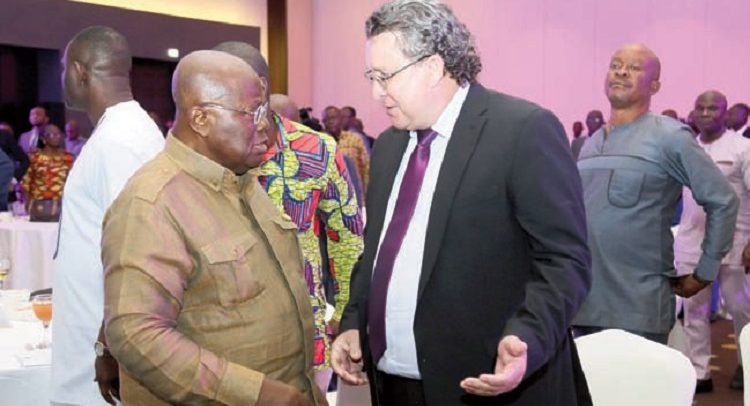President Akufo-Addo interacting with Pierre Laporte (right), Country Director, IMF after the Presidential Roundtable Discussion on Agriculture in Accra
President Nana Akufo-Addo has indicated that the government has changed the strategy of the Planting for Food and Jobs (PFJ) programme in its phase II from a subsidy policy to an input credit system that includes all actors in the agricultural value chain.
He explained that this programme’s design places strong emphasis on commercial agriculture, with a cascading effect on all stakeholders, from production to processing, distribution, and marketing.
Speaking at a meeting with international development partners on the second phase of the PFJ in Accra yesterday, the President said this comprehensive approach would stimulate economic activities within the sector, generate employment, support industrialisation, boost exports, increase incomes, foster rural development, and propel overall economic growth.
The new approach will also be used to competitively leverage the opportunities presented by the Africa Continental Free Trade Agreement (AfCFTA), according to President Akufo-Addo.
The PFJ’s second phase is a five-year flagship programme designed to accelerate agricultural growth in response to the exacerbated challenges it has faced, primarily as a result of the combined impact of COVID-19 pandemic and the Russia-Ukraine war.
Despite the fruitful collaboration that has occurred over the years between the government and Ghana’s development partners, President Akufo-Addo expressed concern about cases of misalignment of priorities between the policies of certain international development agencies and national policies and strategies.
He indicated that the government was concerned by this because projects designed by foreign governments to support Ghana’s agriculture should naturally align with government’s priorities.
He added that “any deviation from this can amount to misdirected investments in the country.”
According to the President, the meeting provided an opportunity for all parties to identify the issues creating the disparity and take corrective action.
He, however, described as unwelcome the situation in which the government, through its agencies such as the Ministry of Finance and the Ministry of Food and Agriculture, has no prior knowledge of some funds being used in the country by international development agencies, despite acknowledging the multifaceted challenges confronting Ghana’s agriculture, particularly in terms of available funding resources.
To achieve optimal results for effective alignment and minimising the risk of duplication, and eliminating the lack of knowledge by government of projects by international development agencies, in favour of a coherent approach that promotes collaboration, the President said, “dialogues, like the one we are having today, are essential, and should be a regular occurrence, providing avenues to discuss challenges, successes, and ensure increased collaboration in the execution of current and future agricultural development plans in Ghana.”
He stressed on the need to urgently complement government’s efforts on the programme through resource mobilisation and funding mechanisms, such as loans, grants, technical assistance, and other agricultural support initiatives, by collaborating with research institutions, farmer organisations, and private sector entities, to ensure increased capacity building, technology transfer and knowledge sharing.
Apart from that, he also stressed the need for monitoring and evaluation towards “ensuring the accuracy of data collection and analysis, thereby helping to address identified weaknesses that affect design, planning, implementation and project outcomes as well as ensure accountability and facilitate evidence-based decision-making.”
Whilst acknowledging government’s responsibility to create a conducive environment through regulatory measures and other incentives, he was confident that, the second phase of the programme “will raise awareness about the potential of Ghana’s agriculture, and draw in the necessary investments, facilitated by your invaluable support, so that we can achieve food security in Ghana.”
By Charles Takyi-Boadu, Presidential Correspondent


